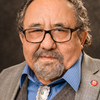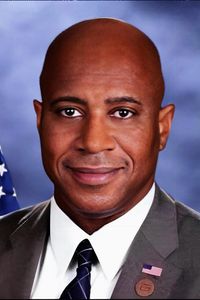Walter Blackman
2025 - Present
2027
0
Walter Blackman (Republican Party) (also known as Walt) is a member of the Arizona House of Representatives, representing District 7. He assumed office on January 13, 2025. His current term ends on January 11, 2027.
Blackman (Republican Party) ran for election to the Arizona House of Representatives to represent District 7. He won in the general election on November 5, 2024.
Blackman also ran for election to the U.S. House to represent Arizona's 7th Congressional District. He did not appear on the ballot for the Republican primary on July 30, 2024.
Blackman also ran for election to the U.S. House to represent Arizona's 2nd Congressional District. He did not appear on the ballot for the Republican primary on July 30, 2024.
Blackman completed Ballotpedia's Candidate Connection survey in 2024. Click here to read the survey answers.
Biography
Walter Blackman graduated from Lakewood University in 2023. He served in the United States Army from 1995 to 2016. He received the Bronze Star Medal and the Meritorious Service Medal. In 2016, Blackman founded W.B. Inclusion & Diversity Consulting and Victim Advocacy Inc. His professional experience includes working as a CEO.[1][2]
He has been affiliated with the following organizations:[2]
- Blackhorse Association
- 1st Cavalry Division Association
- Order of the Spur
- National Armor & Cavalry Heritage Foundation:
- The Armor Association
Sponsored legislation
The following table lists bills this person sponsored as a legislator, according to BillTrack50 and sorted by action history. Bills are sorted by the date of their last action. The following list may not be comprehensive. To see all bills this legislator sponsored, click on the legislator's name in the title of the table.
Elections
2024
State House
See also: Arizona House of Representatives elections, 2024
General election
General election for Arizona House of Representatives District 7 (2 seats)
Walter Blackman and incumbent David Marshall defeated Nancy Hartl and Kevin Chiquete in the general election for Arizona House of Representatives District 7 on November 5, 2024.
Candidate | % | Votes | ||
| ✔ |  | Walter Blackman (R)  | 32.8 | 74,128 |
| ✔ |  | David Marshall (R)  | 32.4 | 73,162 |
 | Nancy Hartl (D)  | 18.1 | 41,026 | |
 | Kevin Chiquete (D)  | 16.7 | 37,786 | |
| Total votes: 226,102 | ||||
 = candidate completed the Ballotpedia Candidate Connection survey. = candidate completed the Ballotpedia Candidate Connection survey. | ||||
| If you are a candidate and would like to tell readers and voters more about why they should vote for you, complete the Ballotpedia Candidate Connection Survey. | ||||
Do you want a spreadsheet of this type of data? Contact our sales team. | ||||
Democratic primary election
Democratic primary for Arizona House of Representatives District 7 (2 seats)
Nancy Hartl and Kevin Chiquete advanced from the Democratic primary for Arizona House of Representatives District 7 on July 30, 2024.
Candidate | % | Votes | ||
| ✔ |  | Nancy Hartl  | 55.3 | 12,871 |
| ✔ |  | Kevin Chiquete  | 44.7 | 10,412 |
| Total votes: 23,283 | ||||
 = candidate completed the Ballotpedia Candidate Connection survey. = candidate completed the Ballotpedia Candidate Connection survey. | ||||
| If you are a candidate and would like to tell readers and voters more about why they should vote for you, complete the Ballotpedia Candidate Connection Survey. | ||||
Do you want a spreadsheet of this type of data? Contact our sales team. | ||||
Republican primary election
Republican primary for Arizona House of Representatives District 7 (2 seats)
The following candidates ran in the Republican primary for Arizona House of Representatives District 7 on July 30, 2024.
Candidate | % | Votes | ||
| ✔ |  | Walter Blackman  | 27.4 | 18,058 |
| ✔ |  | David Marshall  | 24.8 | 16,333 |
| Steven Slaton | 14.1 | 9,292 | ||
 | Andrew Costanzo  | 13.0 | 8,579 | |
 | John Fillmore | 13.0 | 8,571 | |
 | Barby Ingle  | 7.6 | 4,992 | |
| Total votes: 65,825 | ||||
 = candidate completed the Ballotpedia Candidate Connection survey. = candidate completed the Ballotpedia Candidate Connection survey. | ||||
| If you are a candidate and would like to tell readers and voters more about why they should vote for you, complete the Ballotpedia Candidate Connection Survey. | ||||
Do you want a spreadsheet of this type of data? Contact our sales team. | ||||
Campaign finance
Endorsements
Ballotpedia did not identify endorsements for Blackman in this election.
Pledges
Blackman signed the following pledges.
U.S. House
See also: Arizona's 7th Congressional District election, 2024
Arizona's 7th Congressional District election, 2024 (July 30 Republican primary)
Arizona's 7th Congressional District election, 2024 (July 30 Democratic primary)
General election
General election for U.S. House Arizona District 7
Incumbent Raúl Grijalva defeated Daniel Butierez in the general election for U.S. House Arizona District 7 on November 5, 2024.
Candidate | % | Votes | ||
| ✔ |  | Raúl Grijalva (D) | 63.4 | 171,954 |
 | Daniel Butierez (R)  | 36.6 | 99,057 | |
| Total votes: 271,011 | ||||
 = candidate completed the Ballotpedia Candidate Connection survey. = candidate completed the Ballotpedia Candidate Connection survey. | ||||
| If you are a candidate and would like to tell readers and voters more about why they should vote for you, complete the Ballotpedia Candidate Connection Survey. | ||||
Do you want a spreadsheet of this type of data? Contact our sales team. | ||||
Democratic primary election
Democratic primary for U.S. House Arizona District 7
Incumbent Raúl Grijalva advanced from the Democratic primary for U.S. House Arizona District 7 on July 30, 2024.
Candidate | % | Votes | ||
| ✔ |  | Raúl Grijalva | 100.0 | 55,133 |
| Total votes: 55,133 | ||||
 = candidate completed the Ballotpedia Candidate Connection survey. = candidate completed the Ballotpedia Candidate Connection survey. | ||||
| If you are a candidate and would like to tell readers and voters more about why they should vote for you, complete the Ballotpedia Candidate Connection Survey. | ||||
Do you want a spreadsheet of this type of data? Contact our sales team. | ||||
Republican primary election
Republican primary for U.S. House Arizona District 7
Daniel Butierez advanced from the Republican primary for U.S. House Arizona District 7 on July 30, 2024.
Candidate | % | Votes | ||
| ✔ |  | Daniel Butierez  | 100.0 | 24,425 |
| Total votes: 24,425 | ||||
 = candidate completed the Ballotpedia Candidate Connection survey. = candidate completed the Ballotpedia Candidate Connection survey. | ||||
| If you are a candidate and would like to tell readers and voters more about why they should vote for you, complete the Ballotpedia Candidate Connection Survey. | ||||
Do you want a spreadsheet of this type of data? Contact our sales team. | ||||
Withdrawn or disqualified candidates
- Walter Blackman (R)
Campaign finance
Endorsements
Ballotpedia did not identify endorsements for Blackman in this election.
2022
Congress
See also: Arizona's 2nd Congressional District election, 2022
General election
General election for U.S. House Arizona District 2
Eli Crane defeated incumbent Tom O'Halleran and Chris Sarappo in the general election for U.S. House Arizona District 2 on November 8, 2022.
Candidate | % | Votes | ||
| ✔ |  | Eli Crane (R)  | 53.9 | 174,169 |
 | Tom O'Halleran (D) | 46.1 | 149,151 | |
 | Chris Sarappo (Independent) (Write-in) | 0.0 | 76 | |
| Total votes: 323,396 | ||||
 = candidate completed the Ballotpedia Candidate Connection survey. = candidate completed the Ballotpedia Candidate Connection survey. | ||||
| If you are a candidate and would like to tell readers and voters more about why they should vote for you, complete the Ballotpedia Candidate Connection Survey. | ||||
Do you want a spreadsheet of this type of data? Contact our sales team. | ||||
Democratic primary election
Democratic primary for U.S. House Arizona District 2
Incumbent Tom O'Halleran advanced from the Democratic primary for U.S. House Arizona District 2 on August 2, 2022.
Candidate | % | Votes | ||
| ✔ |  | Tom O'Halleran | 100.0 | 71,391 |
| Total votes: 71,391 | ||||
 = candidate completed the Ballotpedia Candidate Connection survey. = candidate completed the Ballotpedia Candidate Connection survey. | ||||
| If you are a candidate and would like to tell readers and voters more about why they should vote for you, complete the Ballotpedia Candidate Connection Survey. | ||||
Do you want a spreadsheet of this type of data? Contact our sales team. | ||||
Withdrawn or disqualified candidates
- Randall Friese (D)
Republican primary election
Republican primary for U.S. House Arizona District 2
The following candidates ran in the Republican primary for U.S. House Arizona District 2 on August 2, 2022.
Candidate | % | Votes | ||
| ✔ |  | Eli Crane  | 35.8 | 38,681 |
 | Walter Blackman | 24.4 | 26,399 | |
 | Mark DeLuzio  | 17.1 | 18,515 | |
 | Andy Yates  | 6.9 | 7,467 | |
 | John W. Moore  | 6.8 | 7,327 | |
 | Steven Krystofiak  | 5.5 | 5,905 | |
 | Ron Watkins | 3.5 | 3,810 | |
| Total votes: 108,104 | ||||
 = candidate completed the Ballotpedia Candidate Connection survey. = candidate completed the Ballotpedia Candidate Connection survey. | ||||
| If you are a candidate and would like to tell readers and voters more about why they should vote for you, complete the Ballotpedia Candidate Connection Survey. | ||||
Do you want a spreadsheet of this type of data? Contact our sales team. | ||||
Withdrawn or disqualified candidates
- Marissa Mitchell (R)
- Myron Lizer (R)
State House
Walter Blackman did not file to run for re-election.
2020
See also: Arizona House of Representatives elections, 2020
General election
General election for Arizona House of Representatives District 6 (2 seats)
Incumbent Walter Blackman and Brenda Barton defeated Coral Evans and Art Babbott in the general election for Arizona House of Representatives District 6 on November 3, 2020.
Candidate | % | Votes | ||
| ✔ |  | Walter Blackman (R) | 28.9 | 59,325 |
| ✔ |  | Brenda Barton (R) | 26.3 | 54,041 |
 | Coral Evans (D) | 25.3 | 51,986 | |
| Art Babbott (Independent) | 19.4 | 39,900 | ||
| Total votes: 205,252 | ||||
 = candidate completed the Ballotpedia Candidate Connection survey. = candidate completed the Ballotpedia Candidate Connection survey. | ||||
| If you are a candidate and would like to tell readers and voters more about why they should vote for you, complete the Ballotpedia Candidate Connection Survey. | ||||
Do you want a spreadsheet of this type of data? Contact our sales team. | ||||
Democratic primary election
Democratic primary for Arizona House of Representatives District 6 (2 seats)
Coral Evans advanced from the Democratic primary for Arizona House of Representatives District 6 on August 4, 2020.
Candidate | % | Votes | ||
| ✔ |  | Coral Evans | 100.0 | 24,035 |
| Total votes: 24,035 | ||||
 = candidate completed the Ballotpedia Candidate Connection survey. = candidate completed the Ballotpedia Candidate Connection survey. | ||||
| If you are a candidate and would like to tell readers and voters more about why they should vote for you, complete the Ballotpedia Candidate Connection Survey. | ||||
Do you want a spreadsheet of this type of data? Contact our sales team. | ||||
Republican primary election
Republican primary for Arizona House of Representatives District 6 (2 seats)
Incumbent Walter Blackman and Brenda Barton advanced from the Republican primary for Arizona House of Representatives District 6 on August 4, 2020.
Candidate | % | Votes | ||
| ✔ |  | Walter Blackman | 59.4 | 26,180 |
| ✔ |  | Brenda Barton | 40.6 | 17,893 |
| Total votes: 44,073 | ||||
 = candidate completed the Ballotpedia Candidate Connection survey. = candidate completed the Ballotpedia Candidate Connection survey. | ||||
| If you are a candidate and would like to tell readers and voters more about why they should vote for you, complete the Ballotpedia Candidate Connection Survey. | ||||
Do you want a spreadsheet of this type of data? Contact our sales team. | ||||
2018
General election
General election for Arizona House of Representatives District 6 (2 seats)
Walter Blackman and incumbent Bob Thorpe defeated Felicia French and Bobby Tyler in the general election for Arizona House of Representatives District 6 on November 6, 2018.
Candidate | % | Votes | ||
| ✔ |  | Walter Blackman (R) | 26.5 | 45,210 |
| ✔ |  | Bob Thorpe (R) | 25.9 | 44,314 |
 | Felicia French (D)  | 25.6 | 43,737 | |
| Bobby Tyler (D) | 22.0 | 37,656 | ||
| Total votes: 170,917 | ||||
 = candidate completed the Ballotpedia Candidate Connection survey. = candidate completed the Ballotpedia Candidate Connection survey. | ||||
| If you are a candidate and would like to tell readers and voters more about why they should vote for you, complete the Ballotpedia Candidate Connection Survey. | ||||
Do you want a spreadsheet of this type of data? Contact our sales team. | ||||
Democratic primary election
Democratic primary for Arizona House of Representatives District 6 (2 seats)
Felicia French and Bobby Tyler advanced from the Democratic primary for Arizona House of Representatives District 6 on August 28, 2018.
Candidate | % | Votes | ||
| ✔ |  | Felicia French  | 59.1 | 16,431 |
| ✔ | Bobby Tyler | 40.9 | 11,348 | |
| Total votes: 27,779 (100.00% precincts reporting) | ||||
 = candidate completed the Ballotpedia Candidate Connection survey. = candidate completed the Ballotpedia Candidate Connection survey. | ||||
| If you are a candidate and would like to tell readers and voters more about why they should vote for you, complete the Ballotpedia Candidate Connection Survey. | ||||
Do you want a spreadsheet of this type of data? Contact our sales team. | ||||
Republican primary election
Republican primary for Arizona House of Representatives District 6 (2 seats)
Incumbent Bob Thorpe and Walter Blackman defeated Stuart McDaniel in the Republican primary for Arizona House of Representatives District 6 on August 28, 2018.
Candidate | % | Votes | ||
| ✔ |  | Bob Thorpe | 41.1 | 16,512 |
| ✔ |  | Walter Blackman | 37.4 | 15,059 |
 | Stuart McDaniel | 21.5 | 8,640 | |
| Total votes: 40,211 (100.00% precincts reporting) | ||||
 = candidate completed the Ballotpedia Candidate Connection survey. = candidate completed the Ballotpedia Candidate Connection survey. | ||||
| If you are a candidate and would like to tell readers and voters more about why they should vote for you, complete the Ballotpedia Candidate Connection Survey. | ||||
Do you want a spreadsheet of this type of data? Contact our sales team. | ||||
Campaign themes
2024
State House
Ballotpedia survey responses
See also: Ballotpedia's Candidate Connection
Walter Blackman completed Ballotpedia's Candidate Connection survey in 2024. The survey questions appear in bold and are followed by Blackman's responses. Candidates are asked three required questions for this survey, but they may answer additional optional questions as well.
| Collapse all
Walt's odyssey began with 21 years of unparalleled service in the U.S. Army, where he fearlessly ventured into the heart of conflict in Iraq and Afghanistan, earning the prestigious Bronze Star. His military tenure laid the bedrock for his impassioned advocacy for veterans' rights and a commitment to serving others.
In a historic turn of events, Walt shattered barriers in 2018, becoming Arizona's trailblazing first African American Republican elected to state office. His tenure in the Arizona House of Representatives ignited a blaze of transformation across the state.
Re-elected in 2020, Walt's leadership as Chair of the Arizona Judiciary Committee from 2021 to 2023 heralded an era of unparalleled legislative success, boasting a monumental 90% success rate and catalyzing an astonishing $2.7 billion surge in revenue for Arizona's prosperity.
During his tenure, Walt orchestrated a symphony of achievements, generating $2.7 billion in new revenue, nurturing the birth of 480 new jobs, and spearheading critical initiatives such as the Arizona Drought Contingency Plan and the visionary Arizona Teachers Academy. Under his stewardship, Arizona experienced unprecedented economic growth, propelling the state to new heights of prosperity.- Forge a Brighter Arizona: Walt Blackman's campaign is dedicated to leading Arizona into a new era of opportunity, unity, and prosperity. His vision encompasses creating a state where every citizen has a chance to thrive, ensuring that no voice is left unheard, and no individual is left behind.
- Innovate, Educate, Prosper: With a focus on innovation, education, and responsible environmental stewardship, Walt Blackman aims to position Arizona as a national leader. His plan involves fostering an inclusive and compassionate environment where unity and collaboration propel the state forward, overcoming obstacles and empowering its people to flourish.
- Empower Entrepreneurship and Economic Growth: Walt Blackman's campaign advocates for small businesses, limited government, and entrepreneurship. By fostering an environment conducive to investment and economic growth, he envisions a thriving economy that benefits all Arizonans. Inspired by Ronald Reagan's principles, he is committed to building a state where dreams soar and possibilities abound, guided by unwavering faith in Arizona's spirit.
Criminal Justice Reform: I am passionate about implementing reforms within our criminal justice system to promote fairness, equity, and rehabilitation. This includes initiatives to reduce recidivism, support reintegration into society for formerly incarcerated individuals, and address systemic issues such as racial disparities and over-incarceration.
Witnessing the impact of the war on my friend's family and the broader community deeply affected me and ignited a sense of empathy and a desire to make a difference. It was a formative experience that shaped my perspective on the world and instilled in me a commitment to serving others and contributing to the greater good.
Throughout his military service and subsequent tenure as an Arizona lawmaker, Walt has demonstrated unwavering dedication to duty, honor, and service to others. His commitment to addressing critical state issues, such as pro-life matters, immigration, education funding, criminal justice reform, and economic growth, reflects his belief in serving the best interests of his constituents and the state as a whole.
1. Integrity: I hold myself to the highest ethical standards and believe in acting with honesty, transparency, and accountability in all aspects of my work.
2. Empathy: I possess a strong sense of empathy and compassion, allowing me to understand and relate to the diverse needs and perspectives of the people I serve.
3. Leadership: I have demonstrated leadership abilities, both in my professional career and in my community involvement, by inspiring others, building consensus, and guiding teams toward common goals.
4. Communication: I excel in communication, both in listening to constituents' concerns and in effectively conveying complex ideas and policies in a clear and accessible manner.
5. Collaboration: I believe in the power of collaboration and teamwork and am adept at building coalitions, forging partnerships, and working across party lines to achieve common objectives.
6. Problem-solving: I am skilled at identifying challenges, analyzing issues, and developing innovative solutions to address complex problems facing our community and state.
7. Resilience: I am resilient and adaptable, able to navigate adversity and setbacks with determination and grace, and to persist in the face of obstacles to achieve positive outcomes.
1. **Representation**: Elected officials are tasked with representing the interests and concerns of their constituents. This involves listening to the needs of the community, advocating for their interests, and ensuring that their voices are heard in the legislative process.
2. **Legislation**: Crafting, proposing, and voting on legislation that addresses the pressing issues facing the state is a fundamental responsibility. This includes drafting bills, collaborating with colleagues, and evaluating proposed policies to determine their potential impact on the community.
3. **Oversight**: Elected officials are responsible for providing oversight of government agencies and programs to ensure accountability and transparency. This involves conducting hearings, reviewing budgets, and monitoring the implementation of laws and regulations.
4. **Constituent Services**: Providing assistance and support to constituents in navigating government services, accessing resources, and addressing their concerns is a crucial aspect of the role. This includes responding to inquiries, resolving issues, and advocating on behalf of individuals or groups within the community.
5. **Community Engagement**: Building relationships with community members, organizations, and stakeholders is essential for effective governance. Elected officials should engage in outreach efforts, attend community events, and foster dialogue to understand the needs of the community and build trust.
Specifically, I hope to leave a legacy of:
1. Empowerment: I want to empower individuals and communities to reach their full potential, providing them with the resources, support, and opportunities they need to thrive.
2. Inspiration: I aim to inspire others to lead with compassion, integrity, and a commitment to making a difference. I hope to serve as a role model for future generations of leaders, encouraging them to embrace their values and work towards positive change.
3. Unity: I seek to foster a legacy of unity and collaboration, bringing people together across divides to find common ground, build consensus, and achieve shared goals.
4. Justice and Equity: I am dedicated to advancing justice, equality, and opportunity for all, working to dismantle barriers and address systemic injustices that hold people back based on race, gender, socioeconomic status, or other factors.
5. Stewardship: I aim to leave a legacy of responsible stewardship, protecting and preserving our natural resources, environment, and cultural heritage for future generations to enjoy and cherish.
6. Service: Ultimately, I hope to be remembered as someone who dedicated their life to serving others, putting the needs of the community above personal gain and leaving the world a better place than I found it.
One aspect of "Profiles in Courage" that resonates with me is its exploration of the personal and political risks involved in standing up for one's convictions. Each profiled senator faced intense pressure and criticism for their decisions, yet they remained steadfast in their commitment to uphold their principles, even at great personal cost.
Reading about these acts of courage has given me strength and inspiration in my own journey, particularly when faced with difficult decisions or challenges. It serves as a reminder that true leadership requires courage, integrity, and a willingness to stand up for what is right, even in the face of adversity.
"Profiles in Courage" has also deepened my appreciation for the complexities of political leadership and the importance of ethical decision-making in public office. It reinforces the idea that leadership is not about popularity or self-interest, but about serving the greater good and making decisions guided by conscience and values.
Atticus embodies the qualities of empathy, fairness, and justice that I aspire to in my own life. He is a wise and principled character who remains steadfast in his beliefs, even in the face of adversity. As Atticus Finch, I would have the opportunity to make a positive impact on the lives of others, fight for equality and justice, and inspire others to do the same.
Overcoming self-doubt has required a concerted effort to challenge negative thoughts, embrace my strengths, and cultivate a positive mindset. Through self-reflection, personal growth, and seeking support from mentors and loved ones, I have learned to believe in myself and trust in my capabilities.
While the journey to overcoming self-doubt has not always been easy, it has been incredibly rewarding. Each step forward has brought greater resilience, self-awareness, and confidence, enabling me to face obstacles with courage and determination.
1. Communication and Collaboration: Open and effective communication between the governor and state legislature is essential for addressing the pressing issues facing the state. Both branches of government should work together collaboratively to develop and implement policies that address the needs and priorities of the state. This involves regular meetings, consultations, and constructive dialogue to find common ground and reach consensus on important issues.
2. Checks and Balances: While collaboration is important, it is also essential for the governor and state legislature to maintain their respective roles and responsibilities as outlined in the state constitution. The legislature acts as a check on the executive branch, providing oversight and accountability, while the governor has the authority to veto legislation and implement executive actions. This system of checks and balances ensures that power is distributed evenly and prevents any branch of government from becoming too dominant.
3. Respect for Separation of Powers: Both the governor and state legislature must respect the separation of powers and the independence of each branch of government. This means refraining from overstepping their authority and respecting the constitutional role of the other branch. While disagreements may arise, it is important for both sides to approach them with respect and a willingness to compromise in the best interests of the state.
1. Water Scarcity and Drought: Arizona is already experiencing the effects of water scarcity, exacerbated by prolonged drought conditions and increasing demand from a growing population. Addressing water management and conservation will be critical to ensuring a sustainable water supply for both urban and rural communities, as well as for agriculture and industry.
2. Climate Change Impacts: Climate change is expected to amplify existing environmental challenges in Arizona, including heatwaves, wildfires, and diminishing water resources. Mitigating the impacts of climate change and implementing adaptation strategies will be essential to protect public health, infrastructure, and natural ecosystems.
3. Education Funding and Quality: Arizona faces persistent challenges in education, including underfunding, teacher shortages, and disparities in educational outcomes. Investing in education, improving teacher compensation and support, and ensuring access to quality education for all students will be essential for the state's long-term economic competitiveness and social well-being.
4. Border Security and Immigration: Arizona's proximity to the U.S.-Mexico border presents unique challenges related to border security, immigration enforcement, and humanitarian concerns. Balancing border security measures with respect for human rights and addressing the root causes of migration will be important for promoting safety and stability in border communities.
1. Understanding of the Legislative Process: Experience in government or politics provides legislators with a deeper understanding of the legislative process, including how bills are drafted, debated, and enacted into law. This knowledge allows them to navigate the complexities of policymaking more effectively and to advocate for their constituents with greater insight.
2. Familiarity with Political Dynamics: Politics can be complex and often involves navigating relationships, alliances, and competing interests. Legislators with previous experience in government or politics are better equipped to understand these dynamics and to build consensus, negotiate compromises, and achieve meaningful results.
3. Knowledge of Policy Issues: Government experience often involves exposure to a wide range of policy issues and challenges facing the state. Legislators with prior experience may have a deeper understanding of these issues and be better prepared to develop informed policy proposals and address complex problems.
4. Relationship Building and Networking: Building relationships with other legislators, stakeholders, and government officials is essential for effective governance. Previous experience in government or politics provides legislators with valuable networks and contacts that can facilitate collaboration and cooperation on legislative priorities.
1. Collaboration and Coalition Building: Building relationships with other legislators fosters an environment of collaboration and cooperation. By working together, legislators can find common ground, negotiate compromises, and advance shared priorities more effectively than if they were working in isolation. Building coalitions across party lines can also help bridge divides and achieve bipartisan solutions to complex issues.
2. Information Sharing and Learning: Building relationships with other legislators allows for the exchange of information, ideas, and expertise. Legislators can learn from each other's experiences, perspectives, and areas of expertise, which can inform their decision-making and enhance the quality of legislation. This information sharing can lead to more informed and effective policymaking.
3. Legislative Effectiveness: Legislators who have strong relationships with their colleagues are often more effective in advancing their legislative agendas. Building trust and rapport with other legislators can increase one's influence and ability to rally support for important bills and initiatives. Additionally, legislators with strong relationships may be more likely to receive support for their own priorities from their colleagues.
4. Problem Solving and Conflict Resolution: Building relationships with other legislators can facilitate problem-solving and conflict resolution. When disagreements arise, legislators who have established positive relationships are more likely to engage in constructive dialogue, find common ground, and resolve conflicts amicably. Strong relationships can help prevent gridlock and promote the smooth functioning of the legislative process.
I am inspired by leaders who prioritize the well-being of their constituents, work tirelessly to address the needs of their communities, and foster a spirit of cooperation and inclusivity in the legislative process. My goal is to learn from the examples set by past and present legislators, drawing on their successes and lessons learned to effectively represent the interests of the people I serve and make a positive impact in their lives.
I believe that effective leadership is not defined by the title or position one holds, but by the values, principles, and dedication to service that one brings to the table. Whether it be in the U.S. Congress, as governor, or in another capacity, my ultimate goal is to continue working tirelessly to advance the well-being and prosperity of Arizona and its residents.
I had the opportunity to meet with a single mother who shared her struggles in navigating the healthcare system to access affordable medical care for her young daughter, who had a chronic illness. She spoke passionately about the challenges she faced in balancing work, caregiving responsibilities, and financial strain, all while advocating for her daughter's health and well-being.
Her story deeply resonated with me, as it highlighted the real-life struggles that many families in our community face when it comes to accessing healthcare and supporting loved ones with medical needs. It reinforced my commitment to advocating for policies that ensure access to quality, affordable healthcare for all Arizonans, regardless of income or circumstance.
Because they make up everything!
The legislature should play a proactive role in defining the scope and limitations of emergency powers, including the duration of such powers, the conditions under which they can be invoked, and the mechanisms for oversight and accountability. This may involve enacting legislation that outlines specific criteria for declaring a state of emergency, establishes procedures for legislative review and approval of emergency orders, and provides avenues for judicial review to safeguard constitutional rights.
Additionally, the legislature should exercise robust oversight of the executive branch's use of emergency powers, ensuring that such powers are used judiciously, proportionately, and in accordance with the law. This may include conducting hearings, issuing subpoenas, and requesting documentation to assess the necessity and effectiveness of emergency measures and to hold government officials accountable for their actions.
Alternatively, if education funding and quality were a top priority, I might introduce a bill focused on increasing resources for schools, improving teacher compensation, or implementing innovative education initiatives to support student success and address disparities in educational outcomes.
Some of the notable endorsements for my campaign include:
1. Arizona Senator Shawnna Bolick
2. Rep. Ben Toma, Speaker of The House, Arizona House of Representatives
3. Former Arizona Senate President Karen Fann
4. Sheriff Mark Lamb, Pinal County
5. Byron Lewis, Snowflake Mayor
6. Chairman Woody Cline, Gila County Board of Supervisors
7. President Jason Whitting, Navajo County Board of Supervisors
1. **Financial Transparency**: I believe in the utmost transparency when it comes to government finances. Citizens have the right to know how their tax dollars are being spent and whether those expenditures align with the priorities and values of the community. This includes providing accessible and easily understandable information about budgets, expenditures, contracts, and financial reports. By increasing transparency, we can promote accountability, deter corruption, and empower citizens to hold their elected officials accountable.
2. **Government Accountability**: Elected officials must be held accountable for their actions and decisions. This accountability extends to all branches and levels of government, from the executive to the legislative and judicial branches. Accountability mechanisms, such as ethics codes, oversight committees, and independent audits, play a crucial role in ensuring that government officials act in the public interest and uphold the rule of law. Additionally, elected officials must be responsive to the needs and concerns of their constituents, actively engaging with the community and addressing issues in a timely and transparent manner.
Note: Ballotpedia reserves the right to edit Candidate Connection survey responses. Any edits made by Ballotpedia will be clearly marked with [brackets] for the public. If the candidate disagrees with an edit, he or she may request the full removal of the survey response from Ballotpedia.org. Ballotpedia does not edit or correct typographical errors unless the candidate's campaign requests it.
U.S. House
Ballotpedia survey responses
See also: Ballotpedia's Candidate Connection
Walter Blackman did not complete Ballotpedia's 2024 Candidate Connection survey.
2022
Walter Blackman did not complete Ballotpedia's 2022 Candidate Connection survey.
Campaign website
Blackman's campaign website stated the following:[3]
| “ |
Border Security The border issue is both a humanitarian crisis and a security threat. Human trafficking is on the rise at an alarming rate. Each year, an estimated 600,000 to 800,000 men, women, and children are trafficked across international borders. Unauthorized migration, criminal networks, and potential terrorists are equally significant security threats to our border. We need to do more than just build a wall. We need to hire more Border Patrol personnel, improve our technology, modernize the ports of entry, and develop stronger partnerships with local border law enforcement departments. Veterans We need to improve access to care by expanding and investing in telehealth, tracking access to care data, offering transportation to VA facilities, and focusing on groups with increased access to care issues. Criminal Justice Our criminal justice system should keep us safe, treat people fairly and respectfully, and be able to change over time. Former inmates should be reintegrated into their communities successfully. Curbing recidivism and eliminating barriers to successful, sustained re-entry will be the priorities as we address a mixture of concerns such as incarceration’s fiscal costs and the humanitarian toll that it takes. China The United States needs to stand firm against China. Walt believes that China is now a rogue state, and attacks on critical IT systems make China a clear and present danger. China’s increasingly aggressive assertions of territorial claims and 20-year military buildup by Beijing during the Obama-Biden Administration have only made China more dangerous and challenging to negotiate with. Only a strong military, increased security on our cybersecurity systems, and a commander-in-chief who understands China’s dangers can protect us from future impending attacks. 2nd Amendment The right to keep and bear arms shall not be infringed. The 2nd Amendment protects the liberty to carry firearms outside the home for self-defense or other lawful purposes. Simply put, under the constitution, I have a right to bear arms. I also believe that people should be responsible for their firearms. When you chip away at the 2nd Amendment, it chips away at American’s most basic of rights. Pro-Life Life starts at conception. Just as Walt is against the death penalty, he is against killing a baby in the womb. Election Integrity Walt is committed to protecting the integrity of the United States’ election process. We must defend our elections from foreign threats. The diversity of state election systems, multiple checks, redundancies in those systems, and post-election auditing all make it difficult for adversaries to change vote tallies. America can not tolerate covert foreign interference in our electoral processes.[4] |
” |
2020
Walter Blackman did not complete Ballotpedia's 2020 Candidate Connection survey.
2018
Ballotpedia biographical submission form
The candidate completed Ballotpedia's biographical information submission form:
| “ | What is your political philosophy?
Walt is a fervent advocate of the 2nd Amendment, Pro-life causes, health care issues, education funding and a common-sense approach to state governing. As an Arizona State Representative Walt wants to put an end to common core in our schools and is for teacher pay raises, bonuses, and performance- based incentives. Walt believes in rural development programs that generate jobs, supports ranchers, creates revenue and new small business opportunities. |
” |
| —Walter Blackman[1] | ||
Campaign finance summary

Committee assignments
2025-2026
Blackman was assigned to the following committees:
2021-2022
Blackman was assigned to the following committees:
- Criminal Justice Reform Committee (Decommissioned), Chair
- House Judiciary Committee
- Federalism, Military Affairs, and Elections Committee
2019-2020
Blackman was assigned to the following committees:
- House Judiciary Committee, Vice Chairman
- Government and Higher Education Committee
- State & International Affairs Committee, Vice Chairman
- Regulatory Affairs Committee
Scorecards
A scorecard evaluates a legislator’s voting record. Its purpose is to inform voters about the legislator’s political positions. Because scorecards have varying purposes and methodologies, each report should be considered on its own merits. For example, an advocacy group’s scorecard may assess a legislator’s voting record on one issue while a state newspaper’s scorecard may evaluate the voting record in its entirety.
Ballotpedia is in the process of developing an encyclopedic list of published scorecards. Some states have a limited number of available scorecards or scorecards produced only by select groups. It is Ballotpedia’s goal to incorporate all available scorecards regardless of ideology or number.
Click here for an overview of legislative scorecards in all 50 states. To contribute to the list of Arizona scorecards, email suggestions to editor@ballotpedia.org.
2022
| To view all the scorecards we found for this legislator in 2022, click [show]. |
|---|
|
In 2022, the Arizona State Legislature was in session from January 10 to June 25.
|
2021
| To view all the scorecards we found for this legislator in 2021, click [show]. |
|---|
|
In 2021, the Arizona State Legislature was in session from January 11 to June 30.
|
2020
| To view all the scorecards we found for this legislator in 2020, click [show]. |
|---|
|
In 2020, the Arizona State Legislature was in session from January 13 to May 26.
|
2019
| To view all the scorecards we found for this legislator in 2019, click [show]. |
|---|
|
In 2019, the Arizona State Legislature was in session from January 14 through May 28.
|
See also
2024 Elections
External links
|
Candidate U.S. House Arizona District 2 |
Officeholder Arizona House of Representatives District 7 |
Personal |
Footnotes
- ↑ 1.0 1.1 Information submitted on Ballotpedia’s biographical information submission form on November 24, 2018
- ↑ 2.0 2.1 Information submitted to Ballotpedia through the Candidate Connection survey on April 16, 2024
- ↑ Walter Blackman 2022 campaign website, "Issues," accessed July 30, 2022
- ↑ 4.0 4.1 Note: This text is quoted verbatim from the original source. Any inconsistencies are attributable to the original source.
| Political offices | ||
|---|---|---|
| Preceded by - |
Arizona House of Representatives District 7 2025-Present |
Succeeded by - |
| Preceded by - |
Arizona House of Representatives District 6 2019-2023 |
Succeeded by - |







